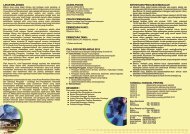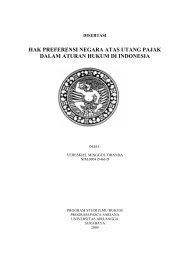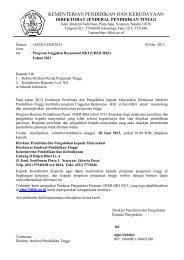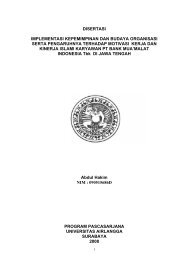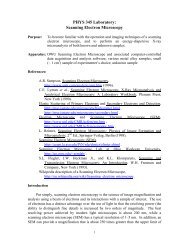Nietzsche's Naturalistic Ethics - UNAIR | E-Book Collection
Nietzsche's Naturalistic Ethics - UNAIR | E-Book Collection
Nietzsche's Naturalistic Ethics - UNAIR | E-Book Collection
Create successful ePaper yourself
Turn your PDF publications into a flip-book with our unique Google optimized e-Paper software.
of those social contracts in the Genealogy, Nietzsche advocates merely that contracts must befulfilled, the paradigmatic example being a loan to be repaid. Fulfilling a contract means making thedebtor whole again by paying back debts. On a somewhat broader reading, Nietzsche advocates theprinciple of pacta sunt servanda: a word given must be a kept, a contract made must be fulfilled,where contracts are conceived more broadly than by way of exchanging material objects. YetNietzsche’s discussion in Dawn suggests that we can understand the Genealogy’s conception ofjustice even more broadly. According to this reading of the debtor-creditor model, individualinteraction involves interference in each other’s “spheres of power:” whenever somebody doessomething for us, gives something to us, or helps us out, she interferes in our sphere of power andexpands her own. The only way of undoing this interference and thus to make us whole again is byinterfering with her sphere of power and undo the imbalance thus achieved. We must return whatwe have received, or something of equivalent value. To give to each what she is owed amounts torestoring one’s sphere of power. The simplest case remains the case of a loan, but contracting,promising, doing of favors, etc. counts on this reading of the debtor-creditor relationship. Anindividual’s motivation for fulfilling the duty is her pride affected by the interference with her sphereof power.3.3 We discuss this broader understanding of what we owe to each other in 3.4. But first I argue thatNietzsche needs this broader reading to answer a question that arises when he discusses thecharacters he praises. “Immoralists,” so we learn, are not just persons of duty, but cannot escapefrom their duties (BGE 226). The masters also acknowledge duties, but only towards each otherwhile despising universal duties (BGE 260 ff; especially BGE 265). To the extent that they help theless fortunate, they do so out of strength, not out of pity. In BGE 272 Nietzsche says that it is a sign20




